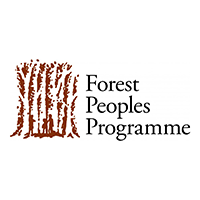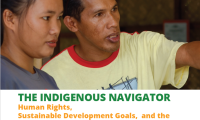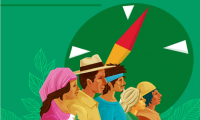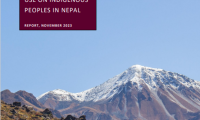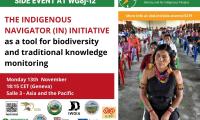Suriname: The Indigenous Navigator, "It really works!"
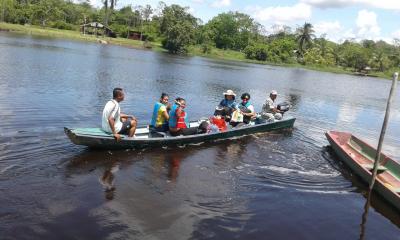
Suriname Testimonials on the use of the IN surveys in Suriname: “It really works!”
In recent weeks (May-June 2019), the research team was working in villages along the Nickerie River, in the forested interior of Suriname. Tapoeripa, Post Utrecht and Cupido are small villages inhabited mostly by Arawak (Lokono) people, who traditionally make their living from fishing, hunting, gathering and planting. The survey process here in West Suriname identified some cross-cutting issues which had also been identified by local communities in other regions.
The Indigenous Navigator tool is being deployed in local indigenous communities in Suriname. In order to use the tools, The Association of Indigenous Village Leaders in Suriname, VIDS (Vereniging van Inheemse Dorpshoofden in Suriname), has translated the questionnaires into Dutch, the official language of Suriname, and trained a number of young talented researchers from indigenous villages to introduce the IN initiative and facilitate the surveys. Village meetings and interviews are done mostly in Sranang Tongo, the lingua franca of Suriname, or in one of the indigenous languages spoken in the village. The research team has already visited different indigenous regions.
In recent weeks (May-June 2019), the research team was working in villages along the Nickerie River, in the forested interior of Suriname. Tapoeripa, Post Utrecht and Cupido are small villages inhabited mostly by Arawak (Lokono) people, who traditionally make their living from fishing, hunting, gathering and planting. The survey process here in the West Suriname identified some cross-cutting issues which had also been identified by local communities in other regions. For example, during the interview to fill out the IN questionnaire, Mrs. Bronne from Post Utrecht stated:
As indigenous peoples, we don’t consider ourselves poor. We make an effort, and when you have something to eat every day, you live, you’re not poor.
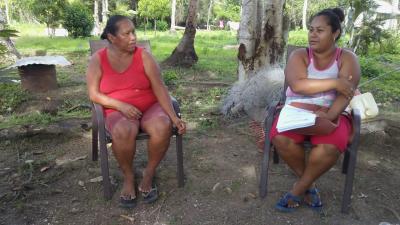
However, the visit of the research team sparked new discussions about the contemporary challenges to the traditional ways of life, for instance the deep impact of climate change:
Climate change is impacting on fishing, hunting and planting, sustained droughts caused creeks do dry up and fishes to die. Hunting game also went deeper into the forest. Due to water shortfalls, plants have grown slower and will bear fruits later than normal - Johannes Sabajo, member of the village board
The information that the trainers provided about indigenous peoples (IPs) rights, and the questions in the surveys, uncovered some of the obstacles that communities experience, and also the disempowerment and lack of awareness surrounding many aspects of their rights as IPs.
The research brought to surface that in the villages along the Nickerie River, most people believe that the government recognizes their collective rights because they are generally not bothered by anyone in their territory. On the other hand, in Tapoeripa several cases were raised around problems with third parties. One example is that the hunters of Tapoeripa cannot enter a particular hunting ground within their customary territory. “This is because this area is claimed by an outsider who is actively guarding it”, said Roberto Hoop, a villager. The village leadership said they have not started a legal process because they do not know the procedures and steps to follow. “If we had known this was an option, perhaps we would do more to claim our rights”.
The communities indicated they are happy with the research because they don’t often consider these kinds of questions. It has put in motion a process of thinking and reflecting on their rights and how to claim them.
I am pleased that you’re doing this research, because now we understand that this is important for us. After the presentation I understood that we are not legally recognized as indigenous peoples in this country, apart from the fact that we’re registered at the central bureau for civil affairs”. “Only after you asked the questions, I started thinking about it!” - Roberto Hoop of Tapoeripa
Mrs. Sabajo (Post Utrecht) said something echoed these reflections in the meeting: “After you [the IN research team] left, I started reflecting on the questions that you asked me. I noticed that we don’t really think about these things, but they are really important for us. I see things more clearly now”.
Carla Madsian, the coordinator of the IN project for VIDS, confirms that the approach that VIDS uses in the implementation of the Indigenous Navigator’s tools is very effective. It leads to a high level of success, namely that VIDS conducts informative village meetings first, then works with local village researchers to do individual and group interviews using the questionnaires. Then it’s possible for the researchers to make a draft report and discuss the draft with the village again for verification of the findings. In this way, there is great benefit and impact at multiple levels of the communities, using the IN not only as data gathering but simultaneously as an education and awareness raising tool.
We get so many positive responses. Because of the questions that are asked, people start thinking about these issues. It works a lot better than giving community members a reader or brochure they have to read. It has a bigger impact than other approaches, the awareness is much higher than before. – Carla Madsian, Coordinator of the IN project for VIDS
Within the villages, this approach triggers discussions and critical thinking about the level of respect for their rights and access to public services.
The practice has proven to be especially important for the team of young community trainers that were trained by VIDS to carry out further training and research in the indigenous villages within the IN project. The training and subsequent fieldwork in the communities has been a great learning experience so far.
Community trainer-researcher Idris Fredison:
Through the training, the connection between SDGs and human rights has become clear to me. As the trainings progressed, I also increasingly realized that the results of the research can be used for various purposes by the villages themselves. The villagers really appreciated that the team, through the questionnaires, came to collect information and provide information about their rights in a personal manner. People indicated that it made them feel that change can happen in their communities. All villages and all participants were very positive about this first phase of the project.
Community trainer-researcher Channa Kiba said:
I learned that we as indigenous peoples look differently at life than non-indigenous. From presenting and working on the IN, I have learned about the rights that we as indigenous peoples have, but which do not get much attention in this country, causing our people to be taken advantage of and being abused.
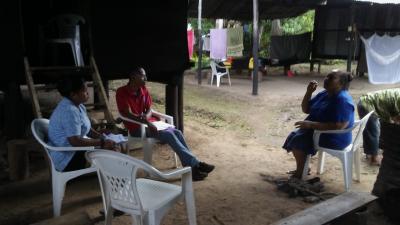
Local researcher Melissa Daniëls and community trainer-researcher Idris Fredison filling out the IN questionnaire with Cupido village basja (board member) Mrs. Jubitana-Karta. “This is a small village and because there are not many children, the government will not provide us with a school boat. That is why families with children move away to Wageningen.”

Crossing the Nickerie River. Post Utrecht is just across Wageningen, a town in the west of Suriname. The villages Post Utrecht, Cupido and Tapoeripa can only be reached by boat.
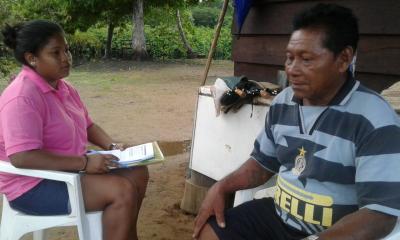
Local researcher Melissa Daniëls filling out the IN questionnaire with village leader Daniëls of Cupido. “We have problems with poachers who are entering our territory for wildlife and birds.”
The project is funded by European Commission - Development & Cooperation - EuropeAid, channelled by Forest Peoples Programme (FPP) executed by VIDS in Suriname under the Indigenous Navigator Initiative.
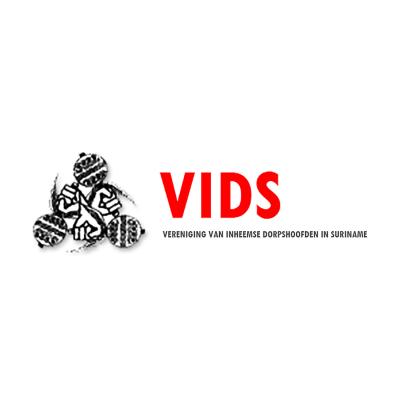
Vereniging Van Inheemse Dorpshoofden In Suriname (VIDS)
